Antimicrobial Drug Discovery
Emerging Strategies
- Publisher
CABI - Published
5th October 2012 - ISBN 9781845939434
- Language English
- Pages 366 pp.
- Size 6.25" x 9.25"
- Images 160 illus
Resistance is on the rise among a variety of human pathogenic microorganisms associated with common and potentially life-threatening infections, including penicillin-resistant Streptococcus pneumonia and Methicillin-resistant Staphylococcus aureus (MRSA). There is increasing demand to approach the threat of multidrug resistance incorporating novel multidisciplinary methodologies and technological platforms. This book documents the latest research, covering current and promising activities in four key areas: computational chemistry and chemoinformatics, High Throughput Screening (HTS), non-vertebrate model hosts and light and nano-based technologies. It is essential reading for researchers and students in microbiology, biotechnology, pharmacology, chemistry and biology as well as medical professionals.
1. Emerging Antimicrobial Drug-discovery Strategies: an Evolving Necessity
2. The Antibiotic Crisis
3. Structure, Genetic Regulation, Physiology and Function of the AcrAB-TolC Efflux Pump of Escherichia coli and Salmonella
4. Small-molecule Efflux Pump Inhibitors from Natural Products as a Potential Source of Antimicrobial Agents
5. Fungal Efflux-mediated Resistance: from Targets to Inhibitors
6. Vacuolar ATPase: a Model Proton Pump for Antifungal Drug Discovery
7. Drug Tolerance, Persister Cells and Drug Discovery
8. Inhibition of Quorum Sensing as a Novel Antimicrobial Strategy
9. Filamentous Temperature-sensitive Mutant Z (FtsZ) Protein as an Antibacterial Target
10. Lysostaphin: a Silver Bullet for Staph
11. Strategies to Identify Modified Ribosomally Synthesized Antimicrobials
12. Quantitative Structure-Activity Relationship-based Discovery of Antimicrobial Peptides Active Against Multidrug-resistant Bacteria
13. Acetyl-CoA Carboxylase as a Target for Antibacterial Development
14. Underexploited Targets in Lipopolysaccharide Biogenesis for the Design of Antibacterials
15. Predicting and Dissecting High-order Molecular Complexity by Information-driven Biomolecular Docking
16. Antifungals and Antifungal Drug Discovery
17. Pathosystematic Studies and the Rational Design of Antifungal Interventions
18. In Vivo High-throughput Antimicrobial Discovery Screens Utilizing Caenorhabditis elegans as an Alternative Host
19. Drosophila melanogaster as a Versatile Model for the Discovery of Drugs Effective against Human Microbe-induced Infection and Pathology
20. Antimicrobial Photosensitizers: Harnessing the Power of Light to Treat Infections
21. Nanoparticle Platforms for Antimicrobial Therapy
22. Antimicrobial Activity of Carbon Nanotubes
George Tegos
George Tegos is an Assistant Professor at the Department of Pathology School of Medicine at the University of New Mexico affiliated with the Center of Molecular Discovery and a Visiting Scientist at the Wellman Center for Photomedicine at Massachusetts General Hospital, Harvard Medical School.
Eleftherios Mylonakis
Eleftherios Mylonakis is a physician-scientist, and his work focuses on the study of microbial pathogenesis and drug discovery. His research has developed a novel alternative to studying bacterial and fungal infection and host responses: the use of invertebrate model hosts. These surrogate invertebrate hosts fill an important niche in fungal pathogenesis research. His investigations have identified novel virulence factors, cross kingdom pathogen-pathogen interactions, novel antifungal agents, and evolutionarily conserved traits that are involved in host virulence and immune responses during infection. Recently, Dr. Mylonakis implemented high-throughput whole-animal Caenorhabditis elegans assay to screen libraries of chemical compounds and identify those with antimicrobial activity. In vivo evaluation of libraries of chemical compounds could solve some of the main obstacles in current antifungal discovery, such as finding new classes of compounds and solving the bottleneck of toxicity/efficacy testing. This approach challenges the position that studies in fungal pathogenesis should focus on the analysis of the "host," the "pathogen," or the "antimicrobial compound." Dr. Mylonakis has published over 150 articles in the scientific literature, and peer-reviewed grants from the National Institutes of Health and private foundations have supported his studies. He is the founding Editor-in-Chief of the journal Virulence and serves on the editorial boards of many publications and as an ad hoc reviewer for over 40 journals.


